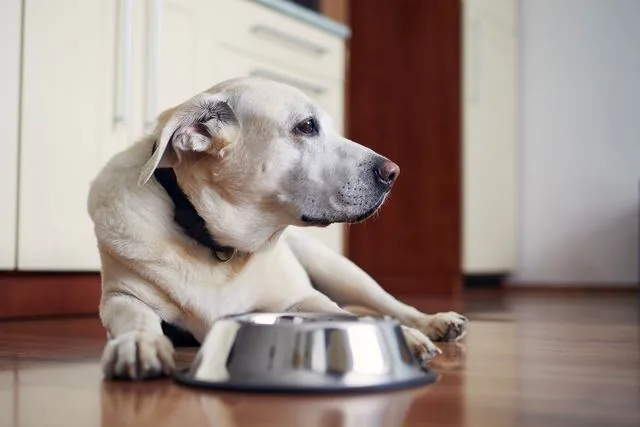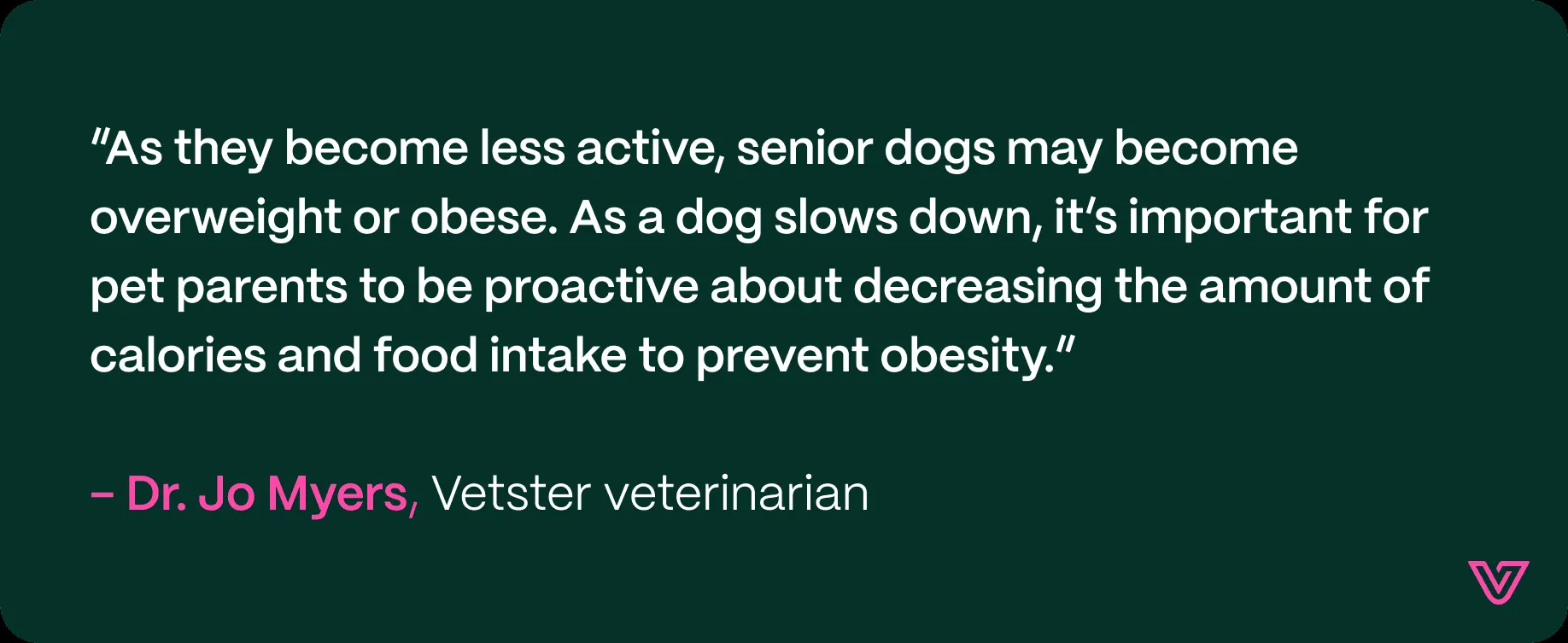As our canine companions enter their golden years, ensuring they receive the best possible care becomes a top priority for devoted pet parents. The transition to seniorhood brings about changes in their nutritional needs, and the sheer volume of options in the pet food and supplement market can be overwhelming. This guide will help you navigate these choices, focusing on whether supplements like Ensure are appropriate for your elderly dog and what their dietary needs truly are.
 A senior dog lying on a hardwood floor in front of its food bowl
A senior dog lying on a hardwood floor in front of its food bowl
We all aspire to provide our dogs with a wonderful quality of life, especially as they age gracefully. It’s natural to feel a sense of responsibility and perhaps even a touch of anxiety when trying to decipher the best dietary support for our older pups. If you’re wondering about your senior dog’s nutritional requirements, this article aims to provide clarity. We will explore:
- What age is considered “elderly” for a dog?
- Does your senior dog specifically need “senior” dog food?
- What kind of dog food is most appropriate for an older dog?
- Are dietary supplements beneficial for senior dogs?
It’s crucial to remember that not all senior dog supplements or pet foods are created equal, and each dog’s needs are unique as they get older. Consulting with your veterinarian is the most reliable way to understand your senior dog’s health and choose the perfect diet to support them.
Defining “Senior” in Dogs
The age at which a dog is considered “senior” varies significantly across different breeds and even individual dogs. Giant breeds, for instance, tend to have shorter lifespans and reach senior status earlier than their smaller counterparts. Rather than a fixed age, veterinarians typically classify a dog as senior when they reach approximately 75% of their expected lifespan. For example, if your dog’s average life expectancy is 10 to 12 years, they would generally be considered senior from around 8 years old. To accurately determine your dog’s life stage, a conversation with your veterinarian is highly recommended.
Evolving Nutritional Needs in Aging Dogs
As dogs mature, their nutritional requirements often shift. Compared to younger adult dogs, most senior dogs benefit from diets that are lower in fat and higher in protein. This adjustment helps maintain lean body mass and reduces the risk of obesity, a common concern in older pets. Additionally, dogs that become less active with age require fewer daily calories to maintain a healthy weight.
For the majority of senior dogs, specialized senior dog supplements are not a necessity. If your dog is on a well-balanced diet tailored to their individual needs, they should be receiving all the essential nutrients to remain happy and healthy.
Selecting the Right Food for Your Senior Dog
There isn’t a universal “best” food for all senior dogs. The ideal diet for an individual dog is determined by their unique nutritional requirements, which are influenced by several factors:
- Underlying Health Conditions: Pre-existing health issues can significantly impact dietary needs.
- Body Condition: Whether your dog is underweight, overweight, or at an ideal weight plays a crucial role.
- Reproductive Status: Factors like spaying or neutering can affect metabolism.
- Activity Level: A more active senior dog will have different caloric needs than a sedentary one.
Foods Labeled for Seniors
The market offers a wide array of dog foods specifically marketed for senior dogs. However, these “senior” formulas may not always be necessary or superior to other options. There are no strict regulatory standards that a diet must meet to be labeled as “senior.” Instead, it’s best to consult with your veterinarian, discussing your dog’s medical history and specific nutritional requirements to select the most appropriate food.
Foods for Age-Related Health Concerns
While aging itself isn’t a disease, senior dogs are more susceptible to chronic health issues. These can include conditions like arthritis, kidney disease, diabetes, and cognitive dysfunction. If your dog develops any of these chronic conditions, their nutritional needs may change dramatically. For instance, a dog with kidney disease will require a different diet than a dog with diabetes. Picky eaters needing to gain weight have different requirements than obese dogs. Older dogs experiencing a dulled sense of smell or pain from dental issues might benefit from wet food. Ultimately, every dog is unique. A nutrition consultation with a veterinarian is an excellent way to pinpoint the right food for your dog. Regular senior wellness exams are also the most effective method for identifying medical conditions that can be managed with nutritional therapy.
Foods for Weight Management
“As they become less active, senior dogs may become overweight or obese,” explains Dr. Jo Myers, a Vetster veterinarian. “As a dog slows down, it’s important for pet parents to be proactive about decreasing the amount of calories and food intake to prevent obesity.” While foods exist to help overweight dogs lose weight, obesity prevention is the most beneficial approach, as it also helps ward off other medical conditions such as poor joint health, diabetes, and heart disease.
 A graphic illustrating a quote about senior dog nutrition
A graphic illustrating a quote about senior dog nutrition
Senior dogs are also more prone to losing healthy muscle body mass as they age. Even overweight dogs that need to shed pounds might have reduced muscle tone that isn’t immediately obvious. High-protein diets can be beneficial for dogs at risk, helping them maintain healthy muscle tissue, promote healthy weight gain, and support good body condition. However, if a senior dog has other conditions, such as chronic kidney disease, a low-protein diet might be recommended. It’s essential to discuss the best plan for balancing your senior dog’s complex nutritional needs with your veterinarian.
Should You Give Your Senior Dog Dietary Supplements?
While some dietary supplements might seem beneficial for aging dogs, it’s important to approach them with caution. Unlike regulated medications, supplements are not required to undergo extensive testing to prove their efficacy. Furthermore, supplements do not always adhere to the same manufacturing standards as food and medications, meaning products on the market could be contaminated or contain undisclosed ingredients.
However, certain dietary supplements for dogs do have scientific evidence suggesting potential health benefits. These may include:
- Glucosamine and Chondroitin: Often recommended for joint health.
- Omega-3 Fatty Acids: May support healthy skin, coat, and cognitive function.
- Vitamin and Mineral Supplements: Can address nutrient deficiencies caused by disease.
- Probiotics: Beneficial for digestive disorders.
While supplements are generally safe when administered as directed, their effectiveness can vary. The lack of strict quality control measures for pet supplements, including natural ones, means the ingredient list may not always be accurate and can even differ from batch to batch. Even if a supplement is safe for your dog, it might not always be necessary. If you have concerns about your dog’s health that you believe could be improved with a supplement, consult your veterinarian.
Choosing the Best Senior Dog Supplements and Food
The most reliable way to understand your dog’s individual needs is through routine wellness exams and diagnostic testing performed by a veterinarian. Senior dogs typically require more frequent wellness checks than younger adults to monitor any changes in their health closely. If your canine companion requires a specific diet, supplement, or specialized care, your vet can guide you in making the right choices.
When selecting dog food, regardless of age, look for an AAFCO (Association of American Feed Control Officials) statement of nutritional adequacy on the label. AAFCO seals indicate that the food has been tested and meets the minimum nutritional requirements for healthy dogs. AAFCO statements are specific enough to categorize food by life stages, so healthy senior dogs should be on a formula labeled for “all life stages” or “senior dogs.”
Pet parents often notice that senior dogs can become pickier eaters as they age. This behavior can stem from dulled senses of smell and taste, common with aging, or it could be related to pain from dental disease. Dogs with arthritis might also find it difficult to eat from low food bowls and appear reluctant to eat. An elevated food bowl can make eating more comfortable.
If a dog’s pickiness leads to unhealthy preferences and subsequent medical problems, it’s crucial to consult a vet before assuming it’s just a matter of preference. Once you’ve confirmed that the behavior isn’t due to an underlying medical condition, you can confidently provide the healthy food options that your aging pup enjoys.
Nutritional needs can change more rapidly in senior dogs compared to younger, mature dogs. If you have questions about your dog’s nutritional requirements or whether a supplement would benefit their health, you can connect with a vet from the comfort of your home through a virtual vet visit.
FAQ – What Food or Supplements Help Senior Dogs?
What is the best food for an elderly dog?
Begin by checking the food label for an AAFCO statement confirming it is nutritionally complete for dogs at “all life stages” or for “senior dogs.” Each elderly dog has unique nutritional requirements based on their activity level, overall health, and weight. Additionally, some senior dogs become pickier due to diminished senses of smell and taste. Senior dog foods may not always be the best fit for your dog’s specific needs. Discuss your dog’s individual food requirements and the most suitable senior diet with your veterinarian.
What do you feed a picky senior dog?
There are pet foods available that are formulated to be more appealing to picky eaters. An older dog with a dulled sense of smell or taste might prefer wet food, which often has a stronger aroma and flavor than the dry kibble they may have enjoyed when younger.
What is the best senior dog supplement?
Senior dog supplements are not extensively regulated or researched, and their effectiveness can vary greatly. Some evidence suggests that certain supplements for stress, joint support, or cognitive decline may offer benefits to elderly dogs. Always consult with a veterinarian before giving your dog any new supplement to ensure it is necessary, safe, and effective.
What supplements help slow down my dog’s aging?
Aging is a natural process, and it affects all living beings, including our beloved canine companions. It can be distressing to witness a senior dog’s physical or cognitive function decline. The most effective ways to support a senior dog’s quality of life include vigilant health monitoring through wellness checks, a complete and balanced diet, safe exercise, and mental stimulation. Some joint supplements may help alleviate joint pain and stiffness, allowing senior dogs to move more comfortably. Omega-3 fatty acids can also contribute to improved skin and coat condition when used in conjunction with regular grooming.
What is the best senior dog supplement for healthy joints?
Many older dogs develop osteoarthritis or other joint conditions as they age. Scientific evidence suggests that supplements containing glucosamine or chondroitin may help support healthy joints in older dogs. Always discuss senior dog supplements with your veterinarian, as not all are safe, effective, or necessary for your specific dog.
